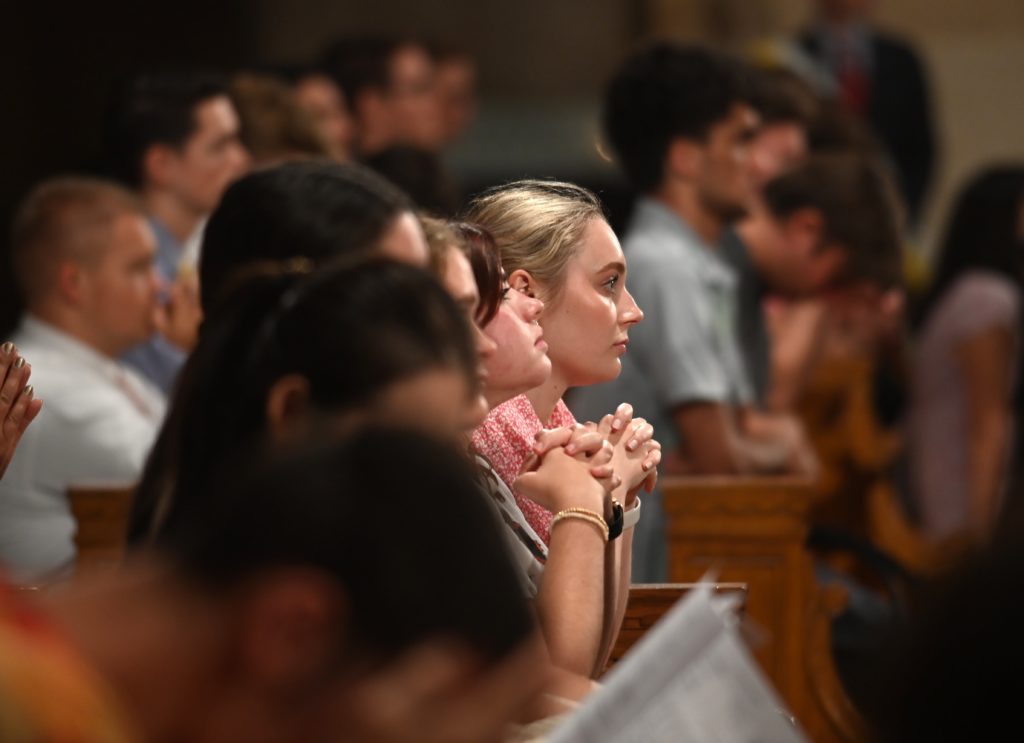In “Soul Searching” (Oxford University Press, $22.95), their 2005 book studying the spiritual lives of American teenagers, Christian Smith and Melinda Lundquist Denton had a harsh assessment of Catholic parents.
They said the religious engagement of Catholics teens, which they described as “fairly weak,” reflected the religious apathy of their parents. Their rule of thumb for us Catholic parents: “We’ll get what we are.”
But what happens when the parents have a high level of religious faith, knowledge, and engagement, yet watch their adult children drift away anyway?
I have recently been speaking with several Catholic parents concerned about their adult children’s lack of religious practice. All of these parents have a high level of faith commitment and involvement above and beyond just Sunday Mass attendance.
Some parents were actively involved in religious renewal movements. Some parents were active in working with the poor and homeless. Some were “professional Catholics,” professors, and writers.
All had educated their children in the Faith, choosing different paths to do so. Some sent them to Catholic schools through high school and even college. A few had home-schooled their children in religious education. One couple had sent their children to a parish religious education program through confirmation. Yet out of 24 children, all in their 20s and 30s, maybe two or three were going to Mass regularly.
One dad paid to send his daughter to a well-known Catholic university where, he said, “she learned to be an atheist.”
This is a source of tremendous pain for parents. Most keep it to themselves, but when I ask them about it, you can hear the frustration. They know the statistics about the growing number of “nones.” An estimated one-third of young adults now say they have no religious affiliation. They thought theirs would be different.
While no parents feel they have a definitive explanation for this erosion of faith, two issues come up frequently. The first is the clergy sexual abuse crisis. I know that the statistics suggest the crisis is easing, at least in terms of the recently ordained. (This statement must be qualified by the observation that most allegations of abuse occur years after the violation.)
Yet if the crisis itself was an earthquake in 2002 with the scandals of Boston and other dioceses, the aftershocks are continuing even now. Some parents acknowledged the impact it had on their own faith. They felt that the bishops still don’t understand the true impact of this corruption, that they seem too quick to want to put the crisis behind them.
The second issue is homosexuality. Many children raised in the last 20 years have had gay friends from high school on. They don’t see any sort of sin or scandal in being homosexual. They see sin and scandal in refusing to accept it.
One mom said her children had been invited to the gay wedding of a longtime friend. She felt she couldn’t say anything lest an argument make the alienation worse.
Other issues came up as well. While some hoped that younger priests might give their children contemporary examples of an active faith, other parents said that the younger priests were often judged way too conservative by their kids. It is almost as if two different generations exist side by side.
And everyone acknowledges the impact of the culture in which all of us exist. For the young, social media obviously plays a huge role, as does entertainment and social movements. The Church seems either a combatant or simply irrelevant. Perhaps their parents do as well.
What will the future bring? Parents take hope in the story of the prodigal son. Children may return to the faith after they marry and have children, or when they face crises for which society has few answers. While such a return has been a historical trend, it could be fading. Sacramental marriages are in sharp decline. Spouses may not be Catholic, or may themselves be disaffiliated Catholics also alienated from the Church.
Some argue that parishes need to be more aggressive in reaching out to college and post-college young adults. Groups for singles, groups for young parents, groups that provide child care. But do bells and whistles and marketing inspire faith? It’s a mega-church solution, but mega-churches have problems of their own.
Smith and Denton target the “relatively low institutional priority” of youth evangelization, formation, and ministry in most dioceses. Dioceses have their own challenges, however, struggling to maintain existing structures, much less expand ministries.
Not every Catholic parent feels anxious about the faith lives of adult children, but those that do may ultimately take St. Monica as their go-to intercessor for their would-be prodigals. St. Monica prayed for 15 years for the conversion of her adult son. That was in the fourth century. And his name? St. Augustine, one of the greatest theologians of the Church.

